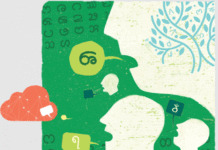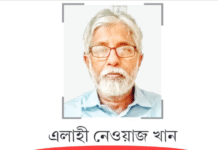Faruque Ahmed
Almost everybody now fear that Bangladesh will not be the same country again after the July 1 massacre at Holey Artisan Café in Gulshan that killed 22 including 18 foreigners. Meanwhile, two more incidents – one related to militants attack aiming the Eid congregation at historic Shalokia ground in Kishoregonj that killed 4 persons including two policemen and another at Kolyanpur in the city in which police killed nine suspected militants have sent alarm signals of more such attacks at home and abroad.
Bangladesh has now become branded as a terrorist infested country and people – be it tourists or businessmen – want to avoid any more visit to this country unless there is an unavoidable reason to be here.
Unconvincing efforts
No doubt police are working relentlessly to ensure safety for all, especially to foreigners who have become panicked about the personal safety as well as about their families. Many of them are planning to leave the country or send families back home to avoid risks. The country is facing a situation when business expansion and investment to new projects are facing severe setback. Foreign Direct Investment (FDI) is also remaining stalled.
Bangladesh is now seriously working in two fronts – internal and external – and police are busy strengthening their counter-insurgency capacity to repulse any possible militants’ attacks and destroy them. In the external fronts, local diplomat are trying to remove fear from the mind of foreigners and instill a sense of confidence in Bangladesh government’s capacity to ensure safety for diplomats and businessmen who can’t so easily leave the stations.
But it appears that widespread fear still persists and prospective foreign visitors are trying to keep away from the country. However, serious government efforts to restore peace and bring back normalcy in public life are on.
Even Foreign Minister Mahmood Ali in a recent interview with a local news agency said despite so many measures being taken, he is still afraid whether Bangladesh will be the same country again. What makes many, including foreigners, feel insecure is the fact that there is not enough realization on the part of the country’s political leadership to treat this extraordinary situation as a political issue in the first place and handle it as such.
The government is doing almost everything to instill confidence in the foreigners, but its apathy towards working for generating national unity and face the situation jointly with all political parties and civil societies are making many doubtful about the government’s maturity in thinking and ability to fight the rising militancy in the country single-handed.
Panic is now everywhere. Colleges and universities are under watch. Younger people are suspect in most cases and parents at home remain concerned about safety of their wards and whether they are involving in any radicalization process. Police raid at bachelors’ mess-houses to look for militants is causing harassment to students and employees living in such facilities. House owners are also in constant fear if militants are living in their houses under fake cover. But one can’t blame police also because they have hold the situation under control. The failure will be highly costly.
Foreigners are least confident
But in such situation the government’s total dependence on law enforcers left many to reasonably believe that police are not enough to defeat militants because it needs creating the right political environment to fight them and restore national consensus and unity which is not the function of police.
Police’s repressive actions on innocent people in many cases are even turning more people hostile instead of restoring peoples’ confidence that the situation is going to improve. Many believe that a highly sensible political leadership can only protect and save the nation and that the task can’t be left on the shoulder of the police leadership alone.
Moreover a highly corrupt and politicized police in many cases is not trusted by the common people. This situation, in fact, appears to be responsible for the creation of a sense of insecurity among the foreigners and common peoples alike making them doubtful about the return of a lasting peace.
Meanwhile, apprehending fresh attacks, the US government which tends to believe terrorist threats as credible in Bangladesh has directed its nationals not to attend any program at Five Star Hotels in Dhaka or any public gathering. Foreigners in Dhaka have been asked to avoid walking on the pavements or use unprotected vehicles. The US Ambassador Marcia Bernicat is also avoiding parties and other programs at the luxury hotels.
Likewise, embassies of Australia, Germany and other European countries have authorised voluntary departure of the family of their personnel posted in Dhaka. Canada has made it mandatory for the families of its diplomats in the High Commission to leave Bangladesh. Two German diplomats have reportedly notified their government that they would not join their work place in Bangladesh. Japan government has asked its diplomats to move to Baridhara, which appears a more secured area after restricting public movements there. Japanese diplomats are to vacate their houses in Gulshan and elsewhere and move into Baridhara immediately.
Worst time for ‘tourism year’
An UK alert said there is a ‘heightened’ threat of further terrorist attacks particularly to be directed against westerners and advised citizens to avoid crowded areas westerners are known to gather. Canada said further attacks cannot be ruled out and could be indiscriminate.
Meanwhile, luxury hotels in Dhaka’s upscale market areas are experiencing slump in business although Bangladesh is in the midst of observing Tourism Year’ this year and thousands of foreigners have cancelled bookings. Many local and international organisations have cancelled their scheduled programs at hotels and conference centres after the July attack. Local restaurants are not having enough visitors as most foreigners are keeping indoors.
Garment industry sources said foreign buyers now want to have negotiations outside the country as they want to avoid visiting Bangladesh. Around 10,000 foreigners cancelled tours to Bangladesh in the one and a half months or so after the July attack, Tour Operators’ Association of Bangladesh (TOAB) sources informed media last week.
Three international conferences scheduled in Dhaka between July and September have been shifted outside the country. According to the Hotel, Guesthouse and Restaurant Owners’ Association, there are 60 hotels and guesthouses in Dhaka’s upmarket areas of Gulshan, Banani, Baridhara and Uttara. Baton Rouge restaurant in Gulshan was very busy with programs of local and international organisations. But they are passing lazy time in the absence of guests in their establishments.
Source: Weekly Holiday









